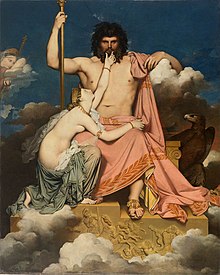Sky father
This article needs additional citations for verification. (April 2013) (Learn how and when to remove this template message) |
In comparative mythology, sky father is a term for a recurring concept in polytheistic religions of a sky god who is addressed as a "father", often the father of a pantheon and is often either reigning or former King of the Gods. The concept of "sky father" may also be taken to include Sun gods with similar characteristics, such as Ra. The concept is complementary to an "earth mother".
"Sky Father" is a direct translation of the Vedic Dyaus Pita, etymologically descended from the same Proto-Indo-European deity name as the Greek Zeû Pater and Roman Jupiter and Germanic Týr, Tir or Tiwaz, all of which are reflexes of the same Proto-Indo-European deity's name, *Dyēus Ph₂tḗr.[1] While there are numerous parallels adduced from outside of Indo-European mythology, there are exceptions (e.g. In Egyptian mythology, Nut is the sky mother and Geb is the earth father).
In historical mythology[edit]
- In Mesopotamian mythology, An or Anu, (AN, 𒀭𒀭𒀭) Sumerian for "heaven, sky", is the father deity of the Sumerian and Assyro-Babylonian pantheon and is also the earliest attested Sky Father deity.
- Indo-European mythology
- In the early Vedic pantheon, Dyaus Pita "Sky Father" appears already in a marginal position, but in comparative mythology is often reconstructed as having stood alongside Prithvi Mata "Earth Mother" in prehistoric times.
- In Ancient Rome, the sky father, or sky god, was Jupiter (Zeus, Ζεύς, in Ancient Greece), often depicted by birds, usually the eagle or hawk, and clouds or other sky phenomena. Nicknames included "Sky God" and "Cloud Gatherer".
- Uranus (mythology) was the primordial greek god of the sky
- Odin the All-Father, the sky god of Germanic/Norse traditions.
- Perun in Slavic mythologies
- Dievas in Baltic mythology
- Ukko in Finnish mythology
- In Māori mythology, Ranginui was the sky father. In this story, the sky father and earth mother Papatūānuku, embraced and had divine children.
- Wākea is a sky father in Hawaiian mythology.
- In Native American mythology and Native American religion, the sky father is a common character in creation myths.[2]
- In China, in Daoism, 天 (tian), meaning sky, is associated with light, the positive, male, etc., whereas 地 (di) meaning earth or land, is associated with dark, the negative, female, etc.
- Shangdi 上帝 (Hanyu Pinyin: shàng dì) (literally "King Above") was a supreme God worshipped in ancient China. It is also used to refer to the Christian God in the Standard Chinese Union Version of the Bible.
- Zhu, Tian Zhu 主,天主 (lit. "Lord" or "Lord in Heaven") is translated from the English word, "Lord", which is a formal title of the Christian God in Mainland China's Christian churches.
- Tian 天 (lit. "sky" or "heaven") is used to refer to the sky as well as a personification of it. Whether it possesses sentience in the embodiment of an omnipotent, omniscient being is a difficult question for linguists and philosophers.
- Tengri "sky", chief god of the early religion of the Turkic and Mongolic peoples.
- In Ancient Egypt, Horus was ruler of the sky. He was shown as a male humanoid with the head of a falcon. It is not uncommon for birds to represent the sky in ancient religions, due to their ability to fly. However, in Egyptian mythology the sky was perceived as the goddess Nut.
- In what is now Colombia, the Muisca (Muisca mythology) used to worship Bochica as the sky father.[3]
- "Taevaisa" (Taevas = sky, isa = father) is the word by which adherents in Estonia of the Maausk (faith of the land) and the Taara native beliefs refer to God. Although both branches of the original Estonian religion - which are largely just different ways of approaching what is in essence the same thing, to the extent that it remains extant - are pantheistic, heaven has a definite and important place in the ancient pre-Christian Estonian belief system. All things are sacred for those of the faith of the land, but the idea of a sky father - among other "sacrednesses" - is something all Estonians are well aware of. In newer history, after the arrival of Christianity, the ideas of a sky father and "a father who art in heaven" have become somewhat conflated. One way or another, the phrase "taevaisa" remains in common use in Estonia.
- The Liber Sancti Iacobi by Aymericus Picaudus tells that the Basques called God Urcia, a word found in compounds for the names of some week days and meteorological phenomena.[4][5] The current usage is Jaungoikoa, that can be interpreted as "the lord of above". The imperfect grammaticality of the word leads some to conjecture that it is a folk etymology applied to jainkoa, now considered a shorter synonym.
See also[edit]
References[edit]
- ^ dyaus in Vedic still retained the meaning "sky", while the Greek Zeus had become a proper name exclusively.
- ^ Judson, Katherine Berry (April 30, 2009). Myths and Legends of California and the Old Southwest. BiblioLife. pp. 5–7. ISBN 978-0-559-06288-9.
- ^ Paul Herrmann, Michael Bullock (1954). Conquest by Man. Harper & Brothers. pp. 186. OCLC 41501509.
- ^ Trask, L. The History of Basque (1997) Routledge ISBN 0-415-13116-2
- ^ Jose M. de Barandiaran Mitologia Vasca (1996) Txertoa ISBN 84-7148-117-0
